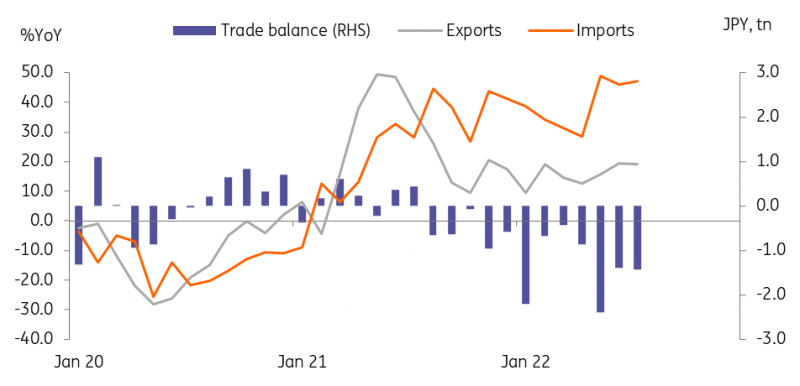Wednesday, August 17, 2022 4:21 AM EST
Japan’s trade deficit widened in July as imports surged due to high commodity prices while forward looking core machinery orders rebounded in June. Today's data supports our view that GDP will likely continue to rise in the current quarter led by investment, but at a slower pace than the previous quarter.

Unsplash
Imports grew faster than exports, deepening the trade deficit in July
Exports rose 19.0% year-on-year in July (vs 19.4% in June), a bit higher than the market consensus of 17.6%. Auto exports to the US and semiconductor exports to China were particularly strong. Meanwhile, imports jumped 47.2% in July (vs 46.1% in June), also above the consensus forecast of 45.5%, mainly led by the high cost of commodities.
Still, as global oil prices have dropped since June, we expect the trade deficit to narrow, with import growth decelerating. Also, auto exports are expected to improve as the production of other major automakers continues to increase. Thus, the contribution of net exports to GDP will likely record a small gain in 3Q (vs 0.0% in 2Q).
Trade deficit widened in July

Source: CEIC
Core machinery orders rebounded slightly in June
A leading indicator of capital spending, core machinery orders rose 0.9% month-on-month seasonally-adjusted in June (vs -5.6% in May), slightly missing the market consensus of 1.0%. In the second quarter, core machinery orders rebounded firmly by 8.1% quarter-on-quarter (vs -3.6% in the first). Thus, we expect Capex investment to improve in the rest of this year, with growth momentum slowing gradually. Auto and electrical machinery orders increased as global supply bottlenecks and China lockdowns eased while semiconductor manufacturing equipment orders fell for the first time in three months.
More By This Author:
US Strength In 3Q To Give Way To Renewed 4Q Weakness Czech Republic: Lower Financing Needs Than MinFin Expects, But Still A Lot To Cover China’s Economic Weakness Goes Beyond Real Estate
Disclaimer: This publication has been prepared by the Economic and Financial Analysis Division of ING Bank N.V. (“ING”) solely for information purposes without regard to any ...
more
Disclaimer: This publication has been prepared by the Economic and Financial Analysis Division of ING Bank N.V. (“ING”) solely for information purposes without regard to any particular user's investment objectives, financial situation, or means. ING forms part of ING Group (being for this purpose ING Group NV and its subsidiary and affiliated companies). The information in the publication is not an investment recommendation and it is not investment, legal or tax advice or an offer or solicitation to purchase or sell any financial instrument. Reasonable care has been taken to ensure that this publication is not untrue or misleading when published, but ING does not represent that it is accurate or complete. ING does not accept any liability for any direct, indirect or consequential loss arising from any use of this publication. Unless otherwise stated, any views, forecasts, or estimates are solely those of the author(s), as of the date of the publication and are subject to change without notice.
The distribution of this publication may be restricted by law or regulation in different jurisdictions and persons into whose possession this publication comes should inform themselves about, and observe, such restrictions.
Copyright and database rights protection exists in this report and it may not be reproduced, distributed or published by any person for any purpose without the prior express consent of ING. All rights are reserved. ING Bank N.V. is authorised by the Dutch Central Bank and supervised by the European Central Bank (ECB), the Dutch Central Bank (DNB) and the Dutch Authority for the Financial Markets (AFM). ING Bank N.V. is incorporated in the Netherlands (Trade Register no. 33031431 Amsterdam). In the United Kingdom this information is approved and/or communicated by ING Bank N.V., London Branch. ING Bank N.V., London Branch is deemed authorised by the Prudential Regulation Authority and is subject to regulation by the Financial Conduct Authority and limited regulation by the Prudential Regulation Authority. The nature and extent of consumer protections may differ from those for firms based in the UK. Details of the Temporary Permissions Regime, which allows EEA-based firms to operate in the UK for a limited period while seeking full authorisation, are available on the Financial Conduct Authority’s website.. ING Bank N.V., London branch is registered in England (Registration number BR000341) at 8-10 Moorgate, London EC2 6DA. For US Investors: Any person wishing to discuss this report or effect transactions in any security discussed herein should contact ING Financial Markets LLC, which is a member of the NYSE, FINRA and SIPC and part of ING, and which has accepted responsibility for the distribution of this report in the United States under applicable requirements.
less
How did you like this article? Let us know so we can better customize your reading experience.





